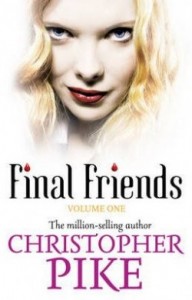A group of friends are facing a messed up senior year when their town closes their high school and transfers them all to Tapp High. Luckily at least some of them get to spend their last year in school together. (Though it seems any friends they had before this are completely unimportant.)
 Jessie comes back from a European vacation late into the first week of school, but that’s okay because her BFFs Sara (the too-cool, vicious mean girl of the group) and Polly (a poor orphaned rich girl with issues) have figured everything and everyone out. Polly’s little sister Alice wants to host a party to help the queen bees of both schools blend. Too bad someone has to die.
Jessie comes back from a European vacation late into the first week of school, but that’s okay because her BFFs Sara (the too-cool, vicious mean girl of the group) and Polly (a poor orphaned rich girl with issues) have figured everything and everyone out. Polly’s little sister Alice wants to host a party to help the queen bees of both schools blend. Too bad someone has to die.
So here’s the good, the bad and the downright ugly. The good:
While a number of the characters start out as stereotypes (and even stay stereotypes) you come to like them. Michael is a good guy with a good head on his shoulders. Jessie makes mistakes, but spends most of the trilogy working to become a better person. Nick is a good guy, as well, and the relationship between he and Maria is very sweet (and should have had much more attention.)
Also there are some pretty compelling bits. While the series starts real slow, Pike is good at layering on the intrigue. The last two chapters of The Party and much of The Dance shows this. The intrigue isn’t only on the Whodunnit either. Why is particularly important.
Polly suffers from depression, probably PTSD and was at one time treated with electroshock therapy. This is particularly bold because 80s teen books usually avoided these kinds of topics.
The bad:
The characters really are eyeroll-worthy stereotypes. It’s hard to sympathize with the stupid, mean rich girl types, which most of the lead females are at some point (if not the whole trilogy).
The mystery plot is thin. Really in these days of police procedural shows on every channel the forensics and logic (not to mention the police response) is painful.
Final Friends, though now released as one volume was original released as three. The dividing made it real clear that the story was stretched past its limit to accommodate three books. In other words, it’s slow with extra fluff added.
The downright ugly:
Some of the stereotypes and descriptive language are downright insulting. Nick is black, and this is hammered into readers at every turn. He’s from the streets, bad at school, with an abusive father and finds success through basketball. Maria is Latino, so of course she’s an illegal alien. She’s also paralyzed at one point but just throws it off and gets better, a trope which many disabled people find insulting. Polly’s struggles with mental health are completely cliche.
Fat shaming is a huge, huge issue. Polly is repeatedly described as fat and constantly eating and mean in The Party, but when she loses weight in book 2 she’s cute and sympathetic again. A terchiary character who is up against our heroes for homecoming queen is exhaustively referred to as fat sometimes because she’s buxom. I felt fat after reading this book.
The final nasty bit is the entire relation between Sara and Russ. Sara is pretty nasty to him despite having a crush on him. She stalks him and her entire relationship with him is based on her wanting to make him into who she thinks he should be. On Russ’ side he’s an alcoholic teen with no direction, little patience for the girl claiming to like him, and being constantly forced or tricked into going out with her. It’s a terrible, terrible relationship with a tacked on happily ever after where reality would put a “Most likely to end in murder”.
Despite the bits that made me snarly I see why it has its fans. Pike captured the feelings that would become Gossip Girl, Pretty Little liars and Mean Girls. Our horrible obsession with well-off, mean people who face real tragedy is front and center in the Final Friends trilogy. If this kind of drama is you thing this is a series to check out.
Contains: language, sex, prostitution, abortion, alcoholism